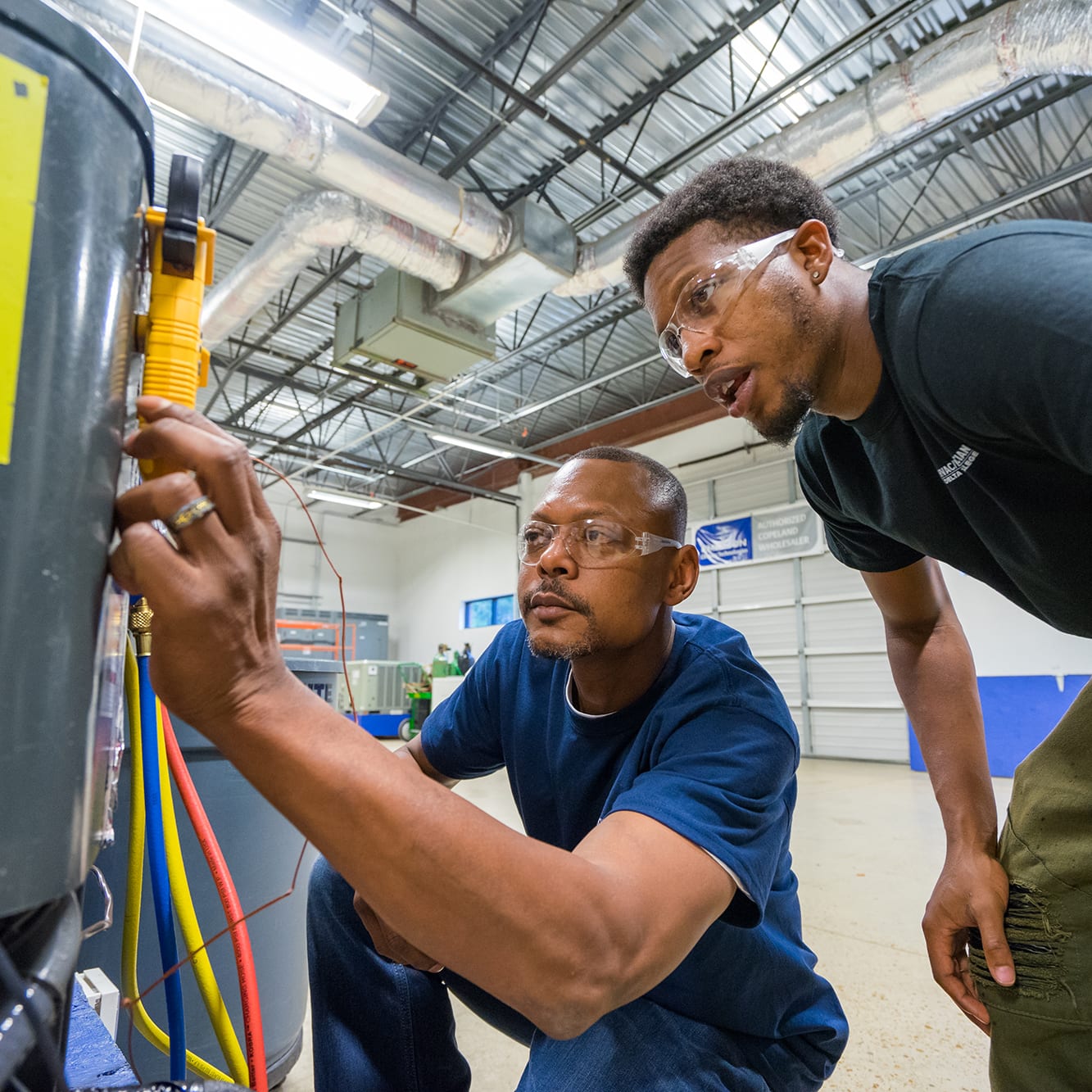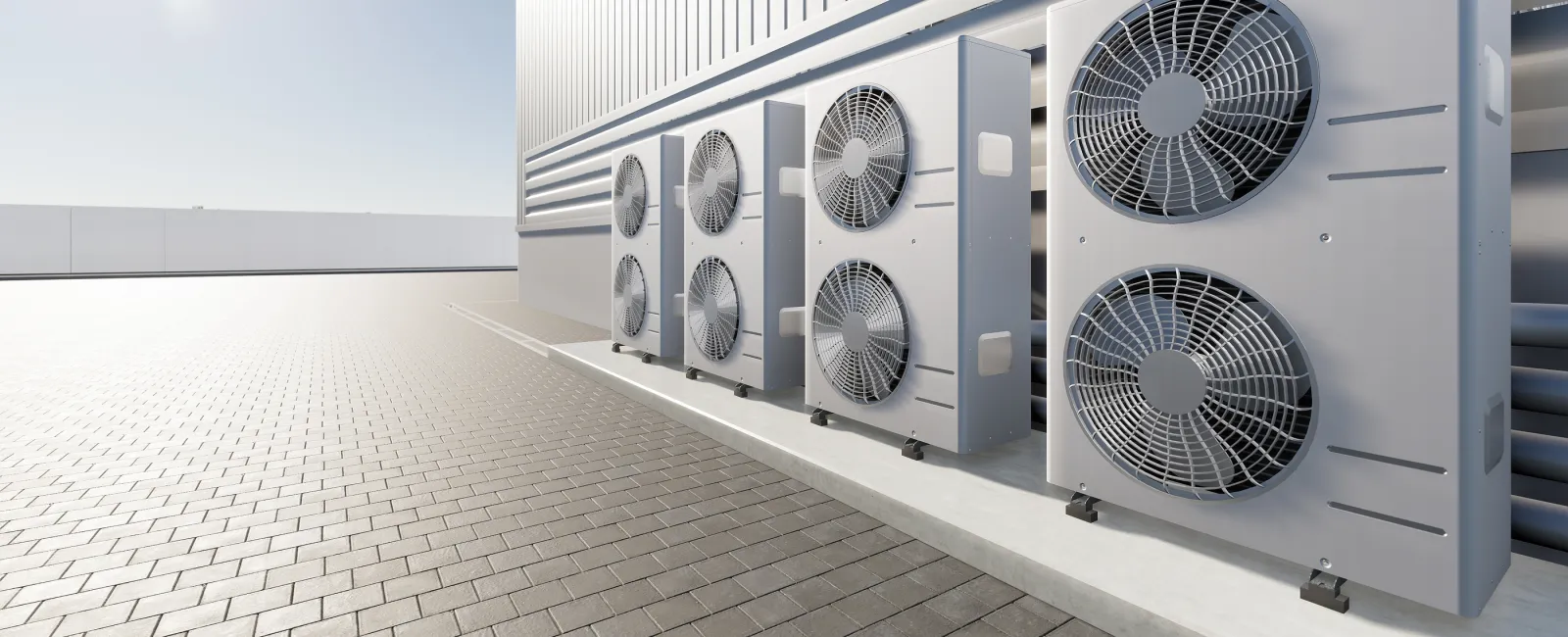Learn why countless homeowners trust HVAC experts for high-performing heating and cooling
Exploring the Essential Parts of an Efficient A/c System
An efficient a/c system is built on several important parts that function in harmony. Each component, from the thermostat to the ductwork, plays an essential role in preserving comfort and power performance. Understanding these components is crucial for optimizing efficiency and improving interior air quality. As one examines these parts, the elaborate partnerships in between them disclose understandings right into boosting overall system effectiveness. What particular variables contribute most to this efficiency?
The Function of the Thermostat in Heating And Cooling Performance

Although frequently overlooked, the thermostat plays an essential function in the performance of a/c systems. HVAC experts. This little gadget functions as the primary control center, regulating temperature level setups and making sure perfect convenience within a space. By accurately sensing the ambient temperature level, the thermostat connects with the home heating, air, and air flow conditioning devices to maintain the preferred climate
A reliable thermostat minimizes power intake by triggering the heating and cooling system just when needed, thereby stopping extreme home heating or cooling. Modern wise and programmable thermostats boost this efficiency better by permitting users to set schedules and from another location readjust setups, adjusting to day-to-day regimens.
The placement of the thermostat is necessary; incorrect area can lead to unreliable temperature analyses, resulting in inefficient procedure. Generally, a well-functioning thermostat not only improves comfort yet likewise adds significantly to power savings and the longevity of the HVAC system.
Comprehending the Importance of Air Filters
Air filters offer a necessary feature in heating and cooling systems by guaranteeing that the air circulating within an area continues to be healthy and balanced and tidy. These filters trap dirt, irritants, and various other toxins, avoiding them from being recirculated throughout the setting. By capturing these particles, air filters add to boosted interior air quality, which can greatly benefit residents' health and wellness, specifically those with allergic reactions or breathing problems.
Additionally, keeping tidy air filters boosts the performance of HVAC systems. Clogged filters can restrict airflow, triggering the system to function tougher to maintain desired temperature levels, causing enhanced energy usage and higher utility bills. Routinely replacing or cleaning filters is a vital upkeep action that can extend the life expectancy of HVAC equipment. Ultimately, recognizing the relevance of air filters enables property owners and building supervisors to take proactive steps to assure a well-functioning, reliable a/c system that promotes a risk-free and comfortable indoor setting.

The Performance of the Furnace and Warmth Pump
Heaters and heatpump are vital elements of heating and cooling systems, in charge of providing heat throughout colder months. Heaters run by heating air through burning or electric resistance, then dispersing it throughout the home using air ducts. They normally supply rapid heating and can be sustained by gas, power, or oil, relying on the system kind.
On the other hand, warm pumps move warm rather than produce it. They remove heat from the outdoors air or ground, even in low temperatures, and move it indoors. HVAC experts. This twin performance enables warm pumps to also give cooling in warmer months, making them functional choices for year-round climate control
Both systems require appropriate upkeep to ensure effectiveness and durability. While heating systems succeed in extreme chilly, warm pumps can be advantageous in moderate environments. Recognizing their distinct functionalities aids home owners in choosing the most suitable alternative for their heating needs.
Exploring the Air Conditioning Unit
The a/c system is an essential element of heating and cooling systems, readily available in different kinds to fit various demands. Understanding the efficiency rankings of these units is crucial for making notified selections about energy intake and cost. This section will certainly explore the varied sorts of ac unit and clear up exactly how performance rankings effect performance.
Kinds Of Air Conditioners
While different factors influence the option of a/c systems, comprehending the various types offered is important for house owners and building managers alike. published here Central air conditioners are created to cool down whole homes or structures, utilizing a network of ducts for air movement. Window systems provide an even more localized remedy, ideal for single spaces or tiny rooms. Portable ac unit provide versatility, permitting customers to move the device as required. Ductless mini-split systems are one more option, incorporating the effectiveness of central systems with the ease of zoning, as they need no ductwork. Ultimately, geothermal systems harness the earth's temperature level for energy-efficient air conditioning. Each kind features unique advantages, making informed choices important for effective environment control.

Performance Scores Discussed
Understanding efficiency scores is necessary for picking the ideal cooling device, as these metrics supply insight right into the system's performance and power usage. The most usual ranking for a/c is the Seasonal Power Efficiency Proportion (SEER), which determines the cooling outcome throughout a normal cooling period separated by the overall electric power input. A greater SEER shows much better performance. Additionally, the Power Efficiency Ratio (EER) is made use of for measuring effectiveness under specific problems. An additional crucial metric is the Energy Star qualification, which indicates that a system meets stringent energy efficiency standards. By reviewing these ratings, consumers can make educated selections that not just optimize convenience but likewise lower energy prices and environmental effect.
The Significance of Ductwork and Air movement
Efficient ductwork layout and air flow management play crucial roles in the total performance and performance of heating and cooling systems. Appropriate ductwork assurances that conditioned air is distributed equally throughout an area, reducing temperature changes and improving convenience. Well-designed air ducts you could try here lessen resistance to air movement, minimizing the work on heating and cooling tools and ultimately decreasing power consumption.
Air movement monitoring includes purposefully placing vents and signs up to enhance the circulation of air. This prevents typical concerns such as hot or cool areas, which can happen when air movement is obstructed or inadequately well balanced. Additionally, the ideal duct materials and insulation can better improve performance by lowering warm loss or gain throughout air transit.
A reliable ductwork system not just contributes to energy financial savings however can additionally extend the lifespan of cooling and heating equipment by minimizing unnecessary pressure (HVAC experts). Subsequently, recognizing the significance of ductwork and air movement is important for accomplishing peak cooling and heating system performance
Regular Maintenance Practices to Improve Efficiency
Normal maintenance methods are important for ensuring peak performance of a/c systems. These methods consist of routine evaluations, cleansing, and necessary repairs to keep the system running efficiently. Frequently changing air filters is important, as clogged filters can block airflow and lower effectiveness. In addition, technicians ought to inspect and tidy evaporator and condenser coils to stop getting too hot and energy wastage.
Annual expert assessments are likewise advised, as experienced service technicians can identify possible issues before they rise. Oiling relocating parts reduces wear and tear, adding to a longer life expectancy for the system. Making certain that the thermostat operates correctly aids in preserving excellent temperature level control.
Frequently Asked Questions
Just how Typically Should I Replace My Thermostat?
Thermostats must generally be changed every 5 to 10 years, depending upon usage and innovation developments. Routine checks are a good idea to ensure peak efficiency, especially if experiencing inconsistent temperature control or boosted power expenses.
What Dimension Air Filter Is Ideal for My A/c System?
The most effective dimension air filter for a HVAC system differs by unit design. Commonly, it's important to get in touch with the owner's handbook or check visit this site right here the existing filter measurements to ensure peak efficiency and air top quality.
Can I Mount a Warmth Pump Myself?
Setting up a heatpump separately is possible for experienced people, but it requires knowledge of neighborhood codes and electric systems. Employing a professional is suggested to ensure appropriate setup and suitable system efficiency.
How Do I Know if My Ductwork Is Effective?
To establish ductwork effectiveness, one must inspect for leaks, measure air movement at vents, evaluate insulation high quality, and examine temperature differences in between supply and return ducts. Specialist assessments can provide complete understandings right into general performance.
What Are Indicators My A/c Demands Immediate Maintenance?
Indicators that an a/c system needs prompt maintenance consist of unusual sounds, inconsistent temperature levels, enhanced power expenses, unpleasant smells, and regular cycling. Resolving these issues without delay can avoid additional damage and assurance peak system efficiency.
Air filters offer an important feature in A/c systems by ensuring that the air flowing within a room remains tidy and healthy. Additionally, keeping tidy air filters improves the performance of HVAC systems. Ductless mini-split systems are another option, combining the effectiveness of main systems with the comfort of zoning, as they call for no ductwork. Understanding efficiency rankings is essential for selecting the right air conditioning unit, as these metrics provide insight into the system's efficiency and power intake. The finest dimension air filter for a HVAC system differs by device design.